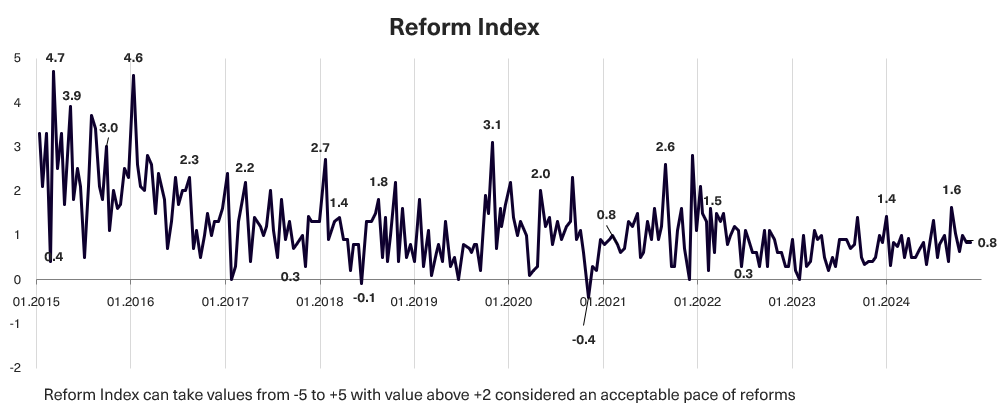The 251st issue of the Reform Index, covering the period from November 4 to 17, features six regulations, with the Index scoring 0.8 points, unchanged from the previous issue. The primary reform highlighted in this issue focuses on replacing the medical and social examination system with an assessment of individuals’ daily functioning conducted by expert teams. This reform falls under two subcategories – “Anti-Corruption” and “Healthcare” – and receives a total score of 3 points from experts.
Graph 1. Dynamics of the Reform Index

Graph 2. Values of the Reform Index and its Components in the Current Assessment Round

Abolition of medical and social examination, +3 points
Cabinet of Ministers Resolution No. 1338 introduces a new system for assessing daily functioning, set to replace the medical and social examination system starting January 1, 2025. From now on, the evaluations will be conducted by expert teams of practicing doctors (ETADF) based at healthcare institutions, and former heads of medical and social examination commissions (MSEC) will not be allowed to join these teams.
Electronic referrals for assessment will be created by the attending physician or the head of the military medical commission without the involvement of the medical advisory commission, as was previously required. The electronic system will randomly assemble an expert team of doctors whose specializations match the needs for evaluating a specific patient’s condition. To reduce the risk of corruption, the doctors will not know the identity of the individual they will be assessing in advance, and the person being evaluated will not know the composition of the expert team.
Individuals will be able to choose an in-person, remote, virtual, or on-site format for their assessment, depending on their needs and circumstances. If necessary, the expert team may refer the individual for additional testing, but this can happen only once to avoid delays in decision-making. Based on the assessment results, a decision will be made regarding the establishment (or not) of disability status, signed by all team members. This decision will replace all previous MSEC certificates. All documentation related to the assessment will be maintained in electronic form.
In addition to determining disability status, the assessment will identify needs for rehabilitation, sanatorium treatment, assistive rehabilitation devices, and other services. This approach ensures comprehensive support for Ukrainians with health issues. The support will focus on restoring normal functioning for individuals as much as possible, whereas the previous system primarily provided financial benefits related to disability. As a result, people were often incentivized to obtain formal disability status, which led to corruption.
A Functional Assessment Center will also need to be established, bringing together doctors from various medical institutions. This center will review the validity of expert team decisions and address appeals regarding commission decisions.
Information about the Reforms Index project, the list of Index experts and the database of the regulations assessed are available here.
Expert commentary
Tetiana Khutor, Head of the Think Tank “Institute of Legislative Ideas”
“This decision was a response to corruption scandals involving several regional MSECs that erupted in 2024. However, the systemic issues were known earlier. In 2021, the National Agency on Corruption Prevention (NACP) conducted a study titled “Top 10 Corruption Risks in the Medical-Social Examination System for Determining Disability,” which clearly outlined the system’s shortcomings. An updated 2024 study, with contributions from the think tank “Institute of Legislative Ideas,” revealed that the system had not undergone significant changes over three years and required fundamental reform.
Draft Law No. 12178 implemented the reforms, overhauling the system and introducing several safeguards to minimize corruption risks. Relevant subordinate acts have already been adopted, including Cabinet of Ministers Resolution No. 1338, which took effect in 2025.
Of course, completely eliminating corruption in this area is unlikely, but these innovations aim to reduce opportunities for corrupt practices and restore trust in the system. The main anti-corruption elements of the reform encompass the following:
- The MSEC system is replaced with a new one in which assessments are conducted by specialized expert teams based at cluster and supra-cluster medical institutions. Patients will be able to approach any team regardless of their place of residence, reducing corruption risks and eliminating MSEC’s “local monopoly.”
- The new model reduces the likelihood of corrupt interactions. The composition of expert teams will change for each case, and assessments can be conducted without in-person presence using video conferencing.
- Electronic document management is introduced.
- Patients or their representatives will have the right to record assessments (both video and audio).
- Members of expert teams will be held responsible for violations, with the possibility of removal from the team for gross misconduct.
Importantly, clear timelines for making disability decisions have been established, significantly speeding up the process and reducing bureaucracy.
These systemic changes and anti-corruption safeguards became integral to the reform, thanks in part to the fruitful efforts of civil society organizations, underscoring the vital role of broad public involvement in driving meaningful societal change.”
Chart 3. Value of Reform Index components and number of events

Reform Index from VoxUkraine aims to provide a comprehensive assessment of reform efforts by Ukraine’s authorities. The Index is based on expert assessments of changes in the regulatory environment in six areas: Governance, Public Finance, Monetary system, Business Environment, Energy, Human Capital. Information about the Reforms Index project, the list of Index experts and the database of the regulations assessed are available here.
Attention
The author doesn`t work for, consult to, own shares in or receive funding from any company or organization that would benefit from this article, and have no relevant affiliations



